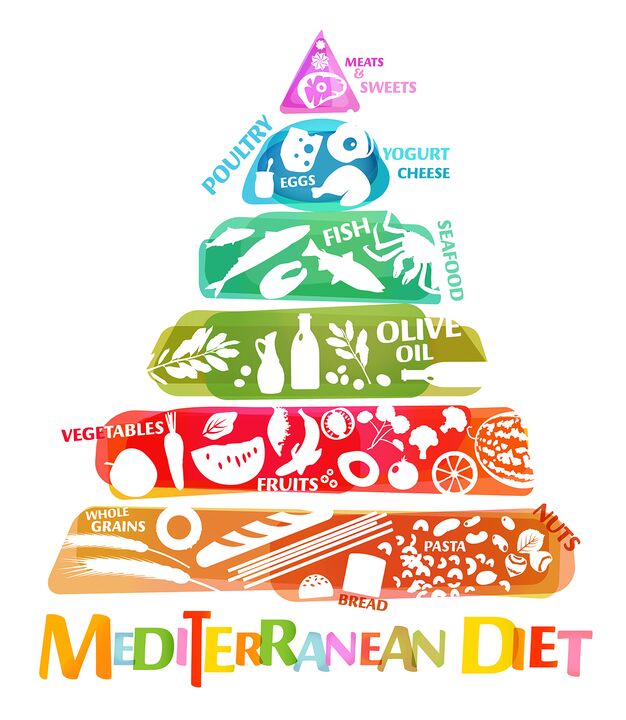
There are no contraindications or severe restrictions to the Mediterranean diet. And most importantly, the pounds cast don’t come back. Together with the doctor, we figure out what the secret is.
How the Mediterranean diet works
The popularity of the Mediterranean diet is easy to explain. Scientists have found that due to the nature of the diet, people in Mediterranean countries rarely suffer from heart disease and obesity. Although in the usual sense it is not really a diet, but rather a set of healthy eating habits that are typical of Greeks, Italians, Spaniards, Moroccans. There are no strict restrictions, rules and numbers here. It is primarily aimed at teaching the body a balanced diet and improving health.
However, the pounds go very slowly and smoothly: it can take about six months to see the first results. But here are the pros. You don’t have to starve, which means your body doesn’t experience stress. This approach allows you to stay in good shape for a long time and prevent weight gain in the future. Another benefit of this diet is that it can be followed continuously as it allows for a tasty, healthy and varied meal.

Foods to be included in the diet
The Mediterranean diet menu is rich in plant dishes, lean fish and seafood. It is balanced and contains all the substances that are important for the body, so it is suitable for almost everyone. Such a diet should not be tried only in case of allergies or individual intolerance to certain foods. Nice bonus: it is allowed to change the menu depending on individual preferences.
- Focus on fresh fruits, vegetables, nuts, legumes and whole grains. They should form the basis of the diet. Nevertheless, try to prioritize the least processed foods, ideally organic products.
- Save red meat and sausages for special occasions. They can be on the menu up to twice a month. Chicken and eggs should not be taken for granted either. But you can’t limit yourself to fish and seafood. With such a diet, it is recommended to eat daily or at least twice a week.
- Eat more dairy products and fermented dairy products that are low in fat. The point is that there is no sugar, no flavor and no filler.
- Drink lots of clean, clean water. Tea and coffee lovers can indulge in their usual pleasure, but they don’t add sugar to their drinks. In addition, if you wish, you can drink a glass of dry red wine daily.
- The Mediterranean diet includes three main meals - breakfast, lunch and dinner. If you feel hungry, you can get a handful of nuts, berries, Greek yogurt or fruit.
- With a diet like this, you don’t have to count calories and monitor the proportion of macronutrients - proteins, fats, carbohydrates - that enter the body. If you decide to dine in a restaurant, choose seafood or fish. In this case, it is advisable to ask them to fry in olive oil.
- Remember healthy sleep and physical activity - exercise for at least 30 minutes a day. Moderate exercise speeds up the weight loss process. In addition, devotees of the Mediterranean diet pay special attention to communicating with their loved ones. Whenever possible, cook and sit down with your family to elevate your mood and relieve stress, which often leads to overeating.
List of main products:
- Vegetables: tomatoes, cucumbers, broccoli, cauliflower, zucchini, spinach, onions, potatoes, Jerusalem artichokes, carrots, turnips.
- Fruits and berries: apples, pears, bananas, oranges, tangerines, strawberries, grapes, dates, figs, melons, peaches.
- Nuts and seeds: almonds, walnuts, macadamia nuts, hazelnuts, cashews, sunflower seeds, pumpkin seeds.
- Legumes: beans, peas, lentils, peanuts, chickpeas.
- Cereals: whole oats, brown rice, rye, barley, corn, buckwheat, wholemeal bread, durum wheat pasta.
- Fish and seafood: salmon, sardines, trout, tuna, mackerel, shrimp, oysters, mussels, crabs, mussels.
- Poultry: chicken, duck, turkey.
- Eggs: chicken, quail, duck.
- Dairy products: cheese, low-fat cottage cheese, Greek yogurt.
- Herbs and spices: garlic, basil, mint, rosemary, sage, nutmeg, cinnamon, turmeric, pepper.
- Healthy Fats: Extra virgin olive oil, olives, avocado and avocado oil.
Some expensive products can be replaced with more affordable and well-known products if needed. So instead of Greek yogurt, you can take regular kefir or homemade yogurt. Whole grains are replaced with buckwheat, barley and oatmeal, and trout or tuna are replaced with herring, which contains the same essential omega-3 fatty acids. White cabbage is a great alternative to broccoli, and seasonal fruits are for figs and peaches. You can also save on olive oil. For example, unrefined sunflower oil contains more omega-6s, phytosterols, and vitamin E.

Foods to avoid
The Mediterranean diet has no taboos. Nevertheless, the consumption of certain foods should be reduced or, better yet, eliminated altogether. These include white sugar, wheat flour, ready meals, refined butter, spirits, soda, fast food and highly processed foods (chocolate, snacks, sausages, sausages). Use dried herbs and spices instead of salt. It is better to gradually give up regular meals - this will help minimize body stress.
Weekly menu option
Monday
- Breakfast: Greek yogurt with fresh berries and granola.
- Lunch: Lentil soup and wholemeal avocado sandwich.
- Dinner: tuna salad with beans, apples and olive oil.
Tuesday
- Breakfast: oatmeal with raisins and honey.
- Lunch: minestrone soup and sea salad.
- Dinner: broccoli casserole and natural yogurt.
Wednesday
- Breakfast: omelette with vegetables, tomatoes and olives.
- Lunch: fried fish and bulgur with green peas.
- Dinner: a glass of kefir and low-fat cottage cheese casserole.
Thursday
- Breakfast: natural yogurt with fruits and nuts.
- Lunch: wholemeal salmon and avocado sandwich.
- Dinner: white cabbage with braised chicken breast.
Friday
- Breakfast: oatmeal with nuts and honey.
- Lunch: brown rice with eggs, onions and avocado.
- Dinner: pasta with seafood and a glass of red wine.
Saturday
- Breakfast: two boiled eggs and fried vegetables.
- Lunch: durum wheat spaghetti and grilled beef.
- Dinner: wholemeal pizza with cheese and vegetables.
Sunday
- Breakfast: steamed cheesecake, fruit and honey.
- Lunch: fish soup, cucumber and tomato salad.
- Dinner: lasagna with vegetables and a glass of red wine.
Efficiency and benefits of the Mediterranean diet
The main benefit of diet is the benefit to the body. It is no coincidence that nutritionists have designated one of the safest food systems for him. This is evidenced by the results of many years of research. Here are some scientifically proven facts about how the Mediterranean diet affects the body.

1. Strengthens the heart
For their study, Spanish scientists invited 7, 447 volunteers between the ages of 55 and 80 who are at increased risk of developing cardiovascular disease. Participants were offered three diets - a Mediterranean diet with extra virgin olive oil, a Mediterranean diet with an emphasis on nuts, and a low-fat diet. For the next five years, the professionals monitored the health of the participants.
The results showed that the risk of stroke and heart attack was reduced by almost a third of those who followed the Mediterranean diet. Scientists say the diet helps remove "bad" cholesterol from the body and normalizes blood pressure and sugar levels.
2. Helps prevent diabetes
The same scientists have tried to find out how the Mediterranean diet affects the incidence of type 2 diabetes. For this, the condition of 418 people who did not have a disease at the beginning of the study was assessed. Those who choose a Mediterranean diet are 52% less likely to develop diabetes than those who follow a low-fat diet.
3. Improves intestinal function
According to a study by an international group of scientists, the Mediterranean diet has a beneficial effect on the intestinal microflora. Experts from Poland, Britain, the Netherlands, France and Italy observed the health of 612 people aged 65-79. Subjects followed a Mediterranean diet for one year. As a result, they lost their bacterial diversity more slowly and increased the number of "good" bacteria and useful fatty acids. At the same time, the number of bacteria involved in the formation of inflammatory chemicals and bile acids has decreased.
4. Prolongs life
Cardiologists at the University Hospital of Saint-Etienne (France) have found that a Mediterranean diet can reduce the risk of premature death. The study involved 605 people who had had a heart attack six months earlier. They were also offered two dining options - the low-fat diet and the Mediterranean diet. The researchers monitored patients ’health for four years. In the Mediterranean diet group, the risk of death was 45% lower for all reasons and that of heart disease was reduced by 70%.
5. Helps you lose weight
With a Mediterranean diet, you can normalize your weight without counting calories. Scientists at the Second University of Naples came to this conclusion. 99 men and 81 women participated in the study. They were divided into two groups. One had to comply with the recommended amounts of protein, carbohydrates and fats, the other - to increase the consumption of whole grains, nuts, fruits, vegetables, olive oil. Two years later, the scientists evaluated the result: weight loss was three times greater in the Mediterranean diet group.
This is confirmed by a study by Canadian experts. According to him, the Mediterranean diet is no less effective than the low carb diet. You can use it to lose up to 10 kg per year. If you want to speed up your weight loss, calculate your calorie intake and stick to it when compiling the menu.
Italian physicians conducted another large study involving 32, 119 volunteers. For nearly 12 years, all participants adhered to the principles of the Mediterranean diet. Long-term adherence to this diet has been shown to reduce the risk of weight gain and fat accumulation in the abdomen for five years after stopping the diet.

Doctor's note
Are there any disadvantages to the Mediterranean diet?
The principles of the Mediterranean diet are in line with WHO recommendations. Rich in vegetables and fruits, proper complex carbohydrates, healthy monounsaturated fatty acids, total protein. Restrictions only apply to fast carbohydrates, fast food, ready meals and foods high in trans fats. Withdrawal of the diet from such foods, the person who follows the principles of the Mediterranean diet, begins to lose weight in the vast majority. The process is not fast, but the best. Rapid weight loss is harmful to health.
As the Mediterranean diet involves consuming large amounts of vegetables, fish, seafood, high quality vegetable oils, the food basket will be more expensive. But health is not worth saving. Because a balanced, nutritious diet is the key to harmonious development.
Dry red wine is considered one of the most important ingredients in the Mediterranean diet, which explains its benefits. Is this really? And how much wine is safe?
Generally, up to 150 ml of wine per day is safe for women and up to 200 ml of wine is safe for men. It is advantageous if this amount is not drunk at once, but is distributed throughout the day. Wine consumption is not an essential part of the Mediterranean diet. It is negligible and should be neglected if you have liver or heart problems or if you are unable to control your alcohol consumption. Wine is more of a geographical tradition.
Who shouldn’t try this diet?
The Mediterranean diet is versatile and has no strict contraindications due to its balanced and varied diet. However, due to its high fat content, this type of diet should be treated with caution in those with liver or gastrointestinal disorders. You should consult your doctor in advance. Of course, it should only be limited to people who suffer from allergic reactions and do not tolerate foods used in their diet.
Some doctors have recommended a Mediterranean diet to prevent coronavirus. Is this justified?
It is important to ensure immunity to fight viral infections. And the activity of the immune system depends directly on what we eat. If your diet is balanced, rich in vegetables and fruits, consuming enough fiber, don’t neglect cereals and legumes, get complete protein and get all the essential fatty acids - your body can fight infections more easily. The Mediterranean diet meets all these requirements. Therefore, it can be used to prevent not only coronavirus but also other viral diseases.




























